Evolve – The Save Game Review
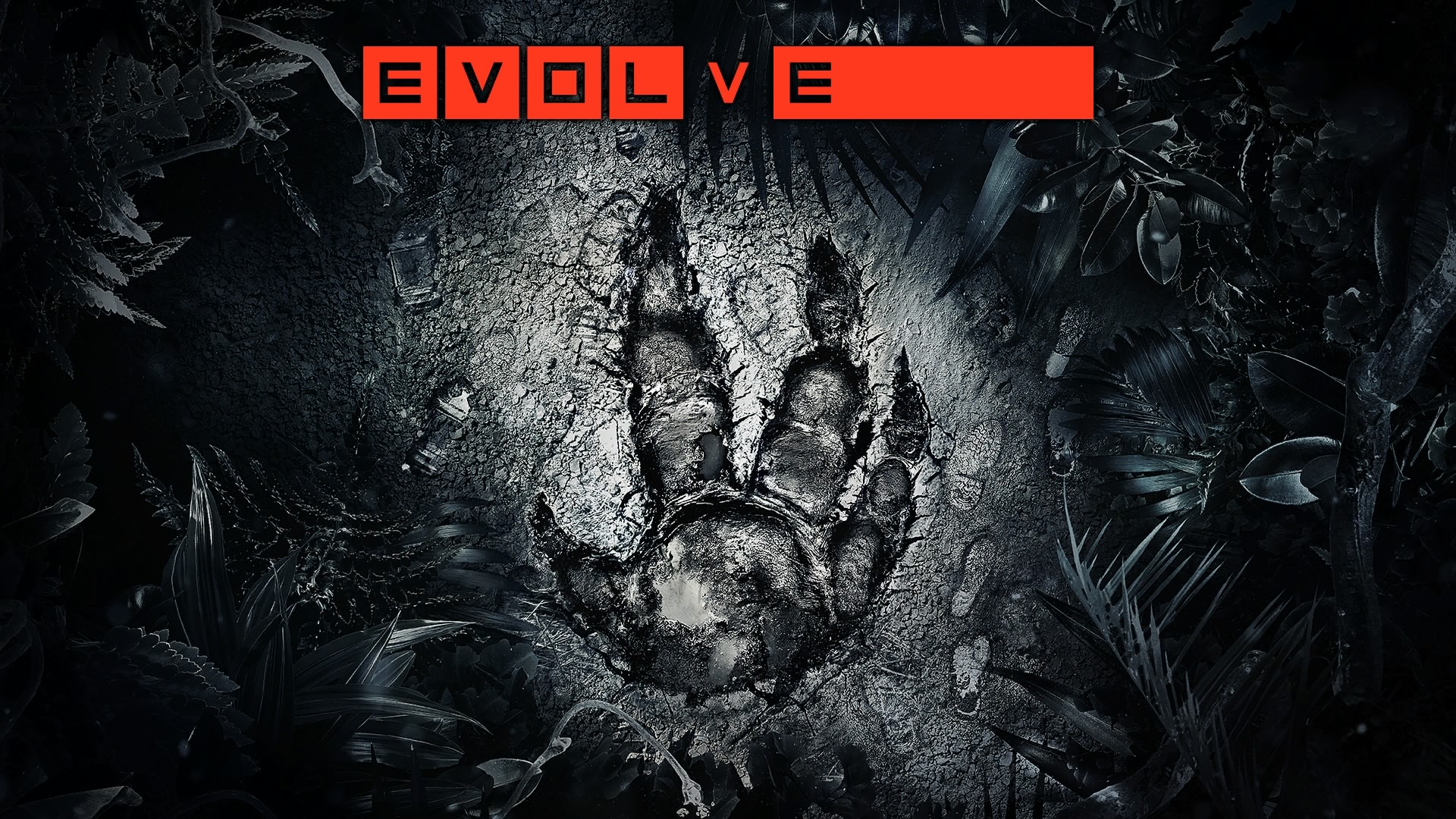
Scary monsters and super creeps; Turtle Rock Studio‘s latest multiplayer game, Evolve, wants to know if you’re the hunter or the hunted.
Set in the not-too-distant future on the otherworld, Shear, Evolve is an asymmetrical multiplayer combat game that pits four players against one. Human colonies are under threat after alien Monsters have started appearing and overrunning the planet. With colonists’ lives at stake, twelve Hunters are recruited to evacuate the planet and save as many people as possible.
The first thing you notice when you start the game up is it’s a bit different from others. There have been plenty of futuristic science fiction games before, and there will be plenty after, but this game is different: it defies labels. It isn’t really a first-person shooter and it isn’t really a third person brawler, it’s both. It’s full of the camaraderie of teamwork but also the solitude of working alone.
In the standard Hunt mode, Hunters are tasked with tracking and killing the Monster while it evolves in three stages. The match ends when either side kills the other, or the Monster reaches the third evolution stage and destroys a power source on the map.
The game requires a lot quick decision-making. Tracking as a Hunter, the Monster is too fast to just rely on following its highlighted prints. You’ll need to use the disturbances in the environment such as fluttering birds, discarded carcasses and the Monster’s evolutionary howls to triangulate its whereabouts and predict where it’s going to be next. Leave it too long and allow the Monster to reach the third stage and the game completely flips, forcing you to scramble to the power source to defend.
As the Monster you need to pick the right time to feed so that you can evolve and become more powerful. Each stage gives you three skill points to invest in your four abilities and what is right is often dependant on the map, your playing style and what you know about the people hunting you. Spend too long feeding and the Hunters will catch up for the kill. Play it safe and you give Hunters more time to track.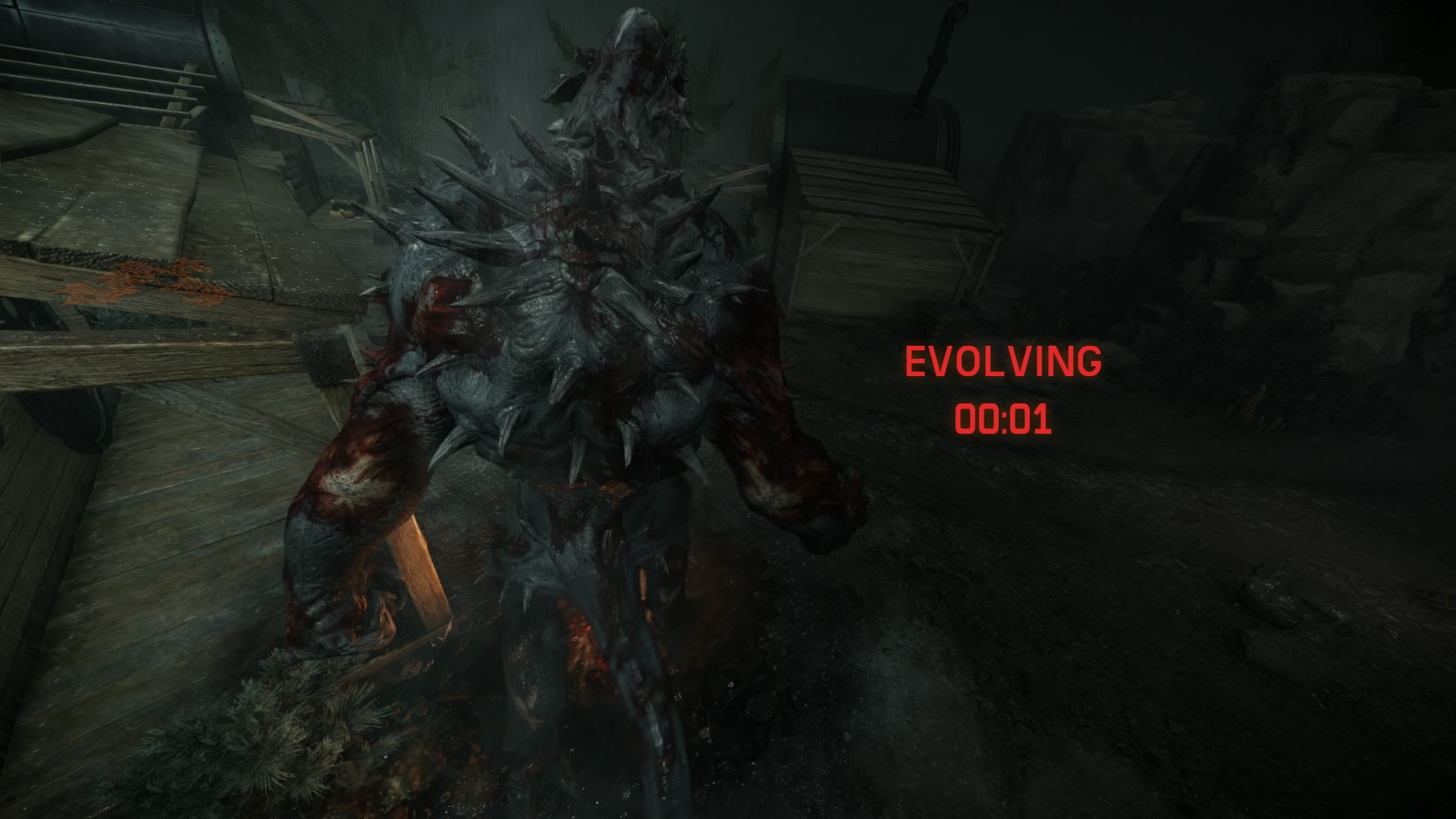
The basic principles of Hunt (tracking, locating, attacking and defending) form the basis of the other four modes: Nest, Rescue, Defend and Evacuation. Nest, Rescue and Defend are timed variations of capture the flag, in which one side must track and defend a target while the other attacks or, as is the case of Rescue, both sides attempt to rescue or kill human colonists. Evacuations are a five round marathon starting with Hunt, ending with Defend and a voting system to select the three rounds in between.
Of course, over all round types, you can also choose to ignore the main objective and kill the opposition for the win.
Each team has four Hunters, one from each class: Assault, Trapper, Support and Medic. Assault is the offensive focal point and deals out the most damage. Trappers help to track and capture the Monster to engage in battle. Support enhances teammate’s abilities and provides bonuses and Medics are charged with keeping the team alive and creating weak spots on the Monster. Each class also has three characters with their own abilities, strengths and benefits.
When playing as a Hunter, you are punished if you don’t know your role. All classes can dish out some level of damage and depending on your character, special abilities can be devastating, but stray too far from your class’ main objective and the game is already lost. For example, spending too much time trying to unleash heavy artillery as the Support class instead of shielding your teammates will result in a quick loss.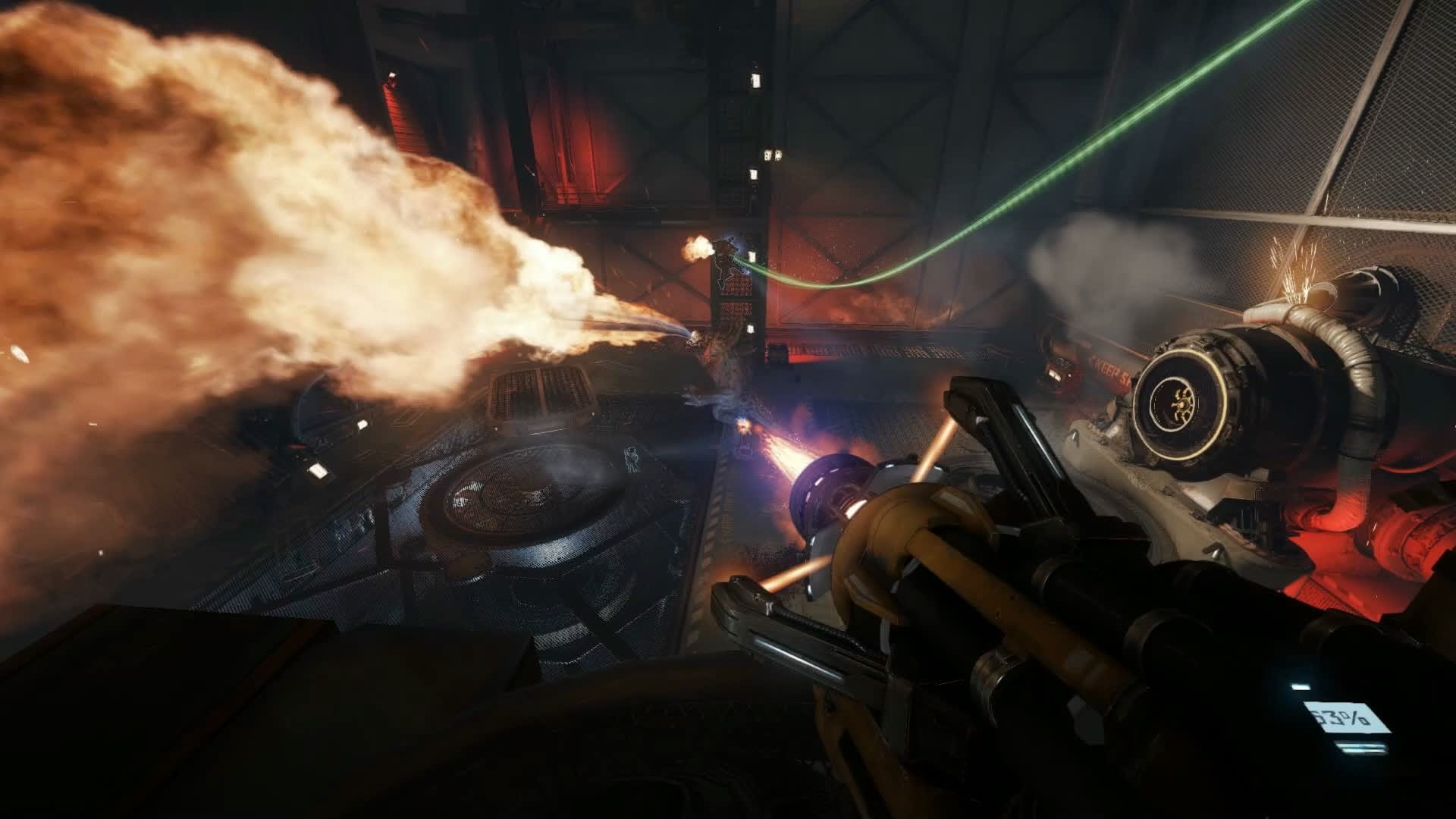
This speaks to the care that has been put into it to ensuring evenness between Hunters and Monsters. Four against one might not seem like a fair fight, but if Hunters aren’t working as a proper unit, the Monster is going to have a field day. I suspect that Evolve has already destroyed some friendships as one player straggles behind, getting lost somewhere on the other side of the map and messing up the team dynamic.
For Monsters, there are three types: Goliath, Kraken and Wraith. The types also have their own strengths and weaknesses; a Goliath relies on brute strength but its attacks are a little slower, the Kraken can fly but deals out small amounts of damage and the Wraith is a master of stealth but has low armour. An additional Monster, the Behemoth was also available as a special edition/pre-order bonus and I am sure more Monsters and Hunters will be announced as DLC in the future.
The Monsters play surprisingly well. I expected Goliath to feel like operating a tank, powerful but cumbersome. To my surprise, however, it moved and responded smoothly, able to make a hasty escape if needed. Fairness remains central to the mechanics of the role, as attacks are a little slower and you are only able to execute one type of attack at a time. As a consequence, it never feels like the Monster has an advantage because of its brute force. It still requires timing. The Monster uses third-person perspective and it does fall down a bit as it was often difficult to adjust to; I regularly found myself swiping at air without realising the Hunter was out of range.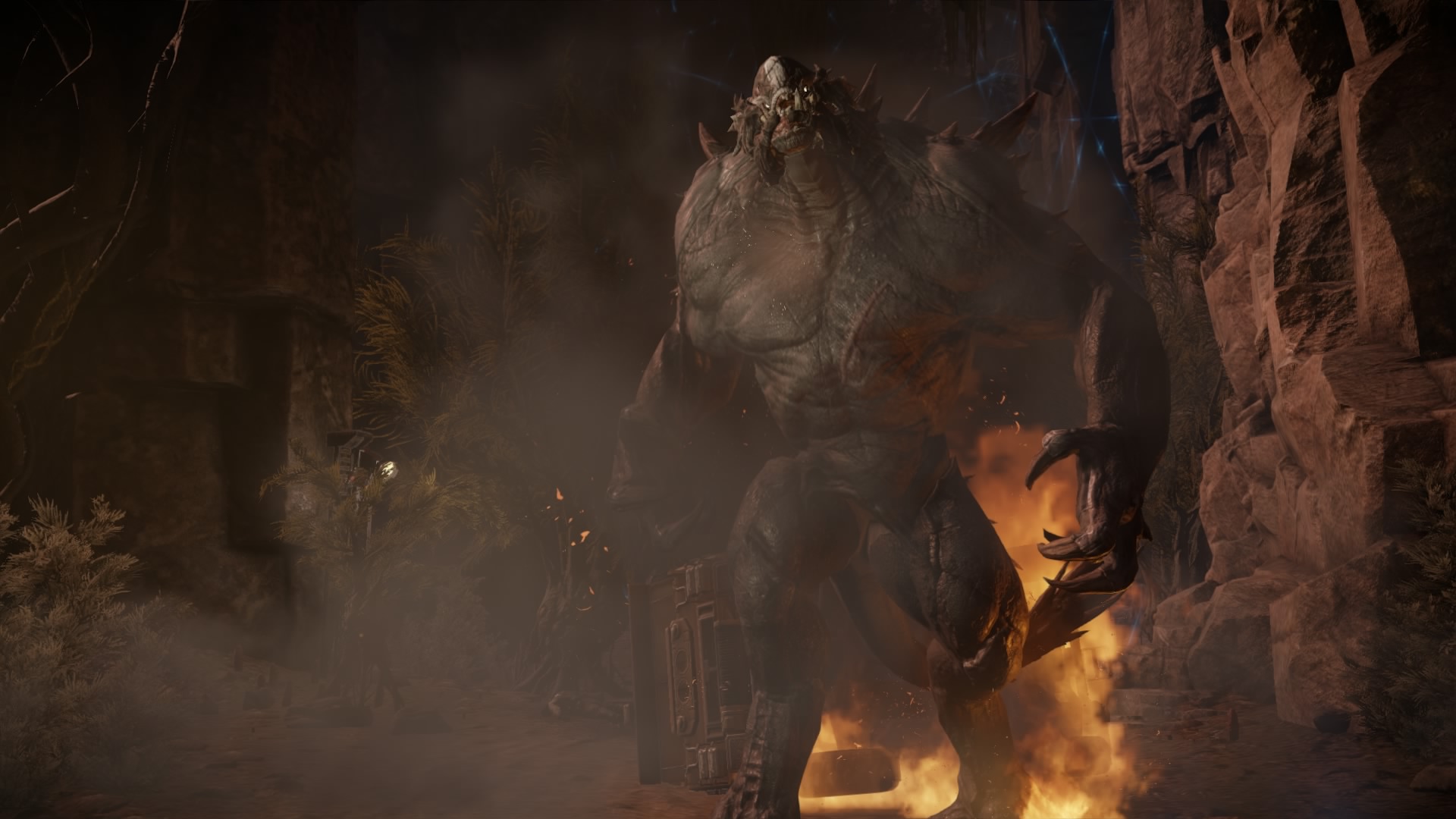
Evolve’s major weakness is unlocking characters which brings it to a grindy halt. Moving up a character’s first tier to unlock the next requires you to meet benchmarks for all their abilities. This is the case for every single class, including the Monster; ten times to unlock every playable character. I understand this is to force players to learn all abilities of a character before moving onto the next, but it’s around the fifth time having to do so that you realise there’s a “u” in Hunt and ignore your teammate’s needs to focus on achieving those benchmarks.
To avoid getting a reputation as a bad teammate, a solo campaign is available, which substitutes other players for AI and also counts towards the ability benchmarks. Unfortunately, Evolve suffers the same fate as other games focused on online play: the AI isn’t very good. In a hunting team it’s difficult to work out what the other members are doing and without the ability to communicate and therefore strategise, something is lost in translation. Conversely, as a Monster you can exploit that lack of complex strategy and quickly finish a game for a hollow victory.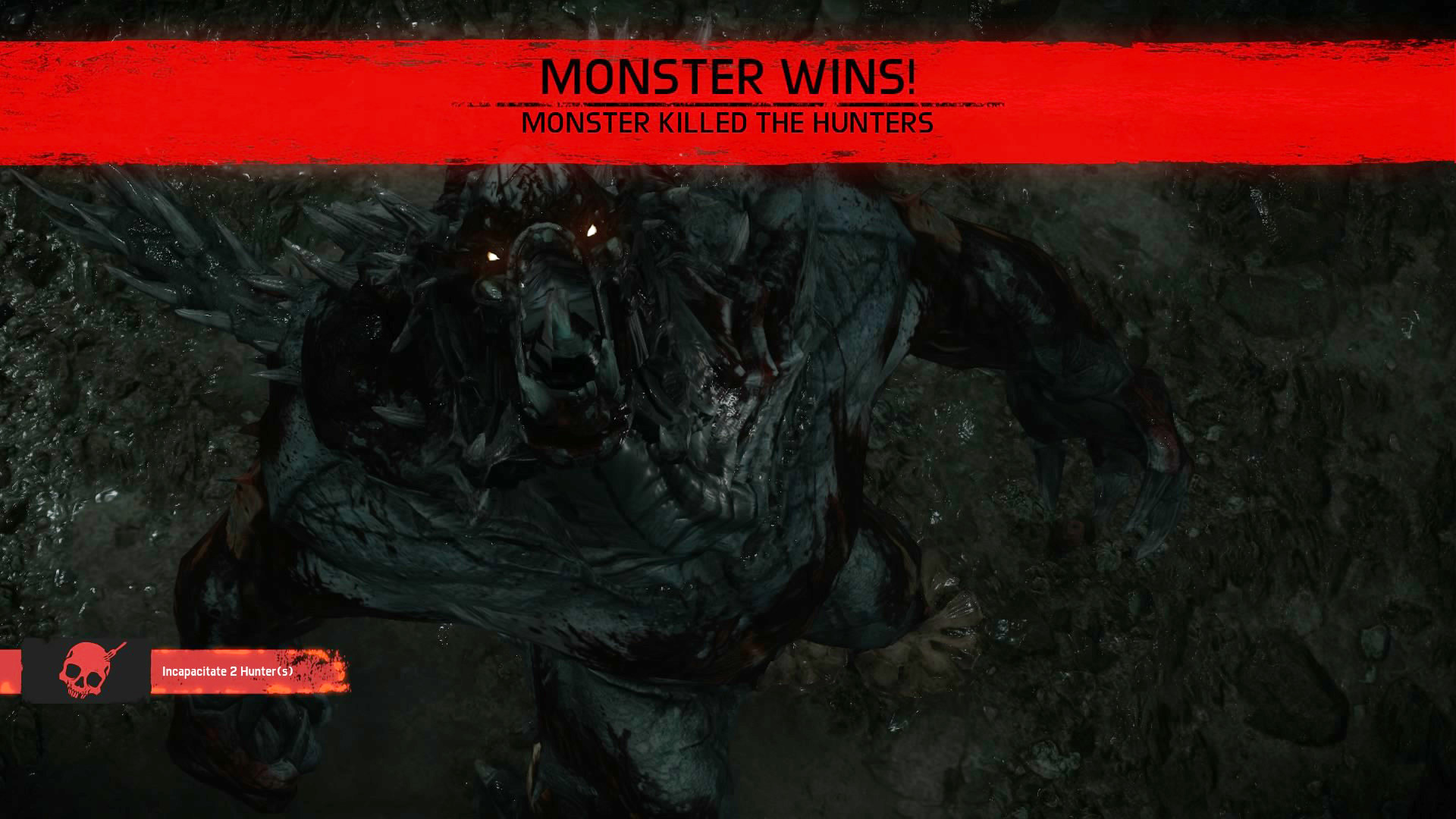
It’s the asymmetry of Evolve that separates it from other games in both the shooter and online multiplayer genres. It does, of course, have elements of both and also includes elements from other genres – fans of RPG MMOs will be reminded of hectically filling skill trees on the fly when playing as a Monster – but it feels greater than the sum of its parts. The cynical could call it a gimmick, but I prefer to think of it as a challenge to the industry.
With the latest generation of consoles nearing its 18-month mark, there is a desire for the next generation of games to arrive as well. Playstation and Microsoft have already joined PC platforms like Steam in successfully investing in indie developers and that should be a good indication for large developers to start making riskier games. Turtle Rock and their distributor 2K Games have taken a risk and it’s paid off.
What they have created is an ever-changing game experience in which players must equal-parts predict, adapt and react to succeed. By removing the ultimately predictable AI element and replacing it with people and their infinitely diverse and complex histories and motivations, they have provided an environment in which players can re-enact The Most Dangerous Game. It’s tag line “Hunt or be Hunted. Choose your side” is a red herring. It isn’t asking what role you want to play, Hunter or Monster, it’s asking how will you play the game.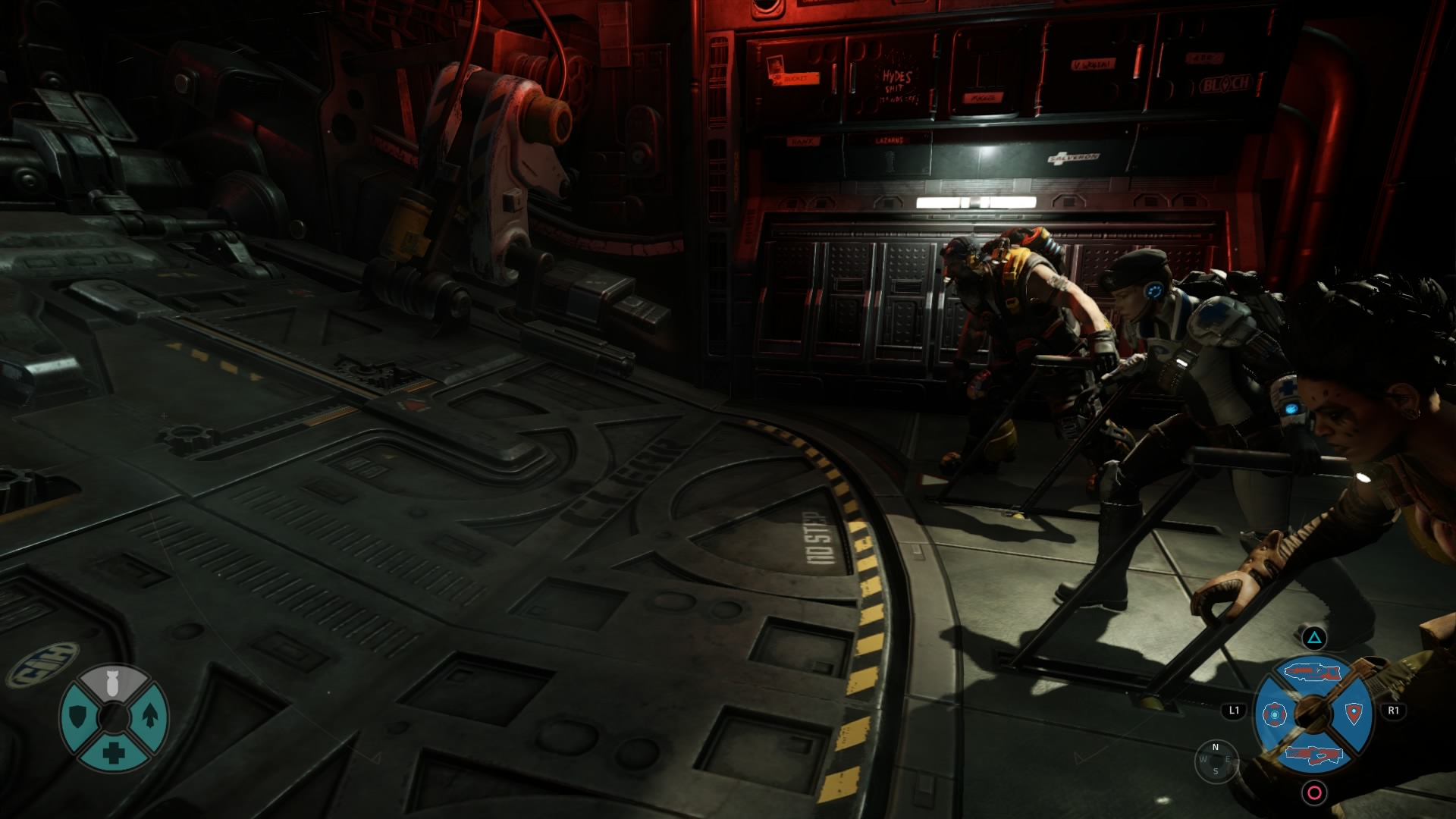
That, to me, is one of the most fascinating parts of Evolve and goes far in explaining why already the Monster role has become a favourite for so many. You can fly under the radar, you can lead your opposition into an ambush or you can aggressively evolve and attack as soon as possible. Just because Hunters have come into your house, doesn’t mean you have to be the prey.
This, too, is a point that deserves discussion. Turtle Rock has set up a grand hunt without labouring an ethical viewpoint. As far as it is discussed in game, the Monsters are killing human colonists on Shear and this threat must be stopped. Beneath the surface, however, there is ambiguity, in particular with little understanding or discussion of any of the Monsters apart from the danger they pose to human lives. It’s assumed that they are also alien to the planet, though without explaining how they managed to travel to Shear, it’s more likely the planet is their homeland. Therefore it’s their home that’s being invaded, not the human’s colonies. If only in a small way, Evolve is an experiment in how easy it is to be swept away by motivation without considering consequence.
It should come as a surprise, then, that at its core, Evolve doesn’t really have a lot of storyline. Apart from what I’ve already talked about, there isn’t much to it. During the solo campaign, which returns dialogue purposely removed from online to reduce aural confusion, Hunters talk amongst themselves, revealing snippets of the history of Shear, the Monsters and themselves, but that’s about it. It’s just a backdrop to the action. That, by itself, could be it’s greatest achievement: to elicit a philosophical reaction through experience rather than exposition.
When Evolve works, it really works and the fun of hunting other players is amazing for both sides. It’s a strange ability for a game to cater to players who prefer being in a team and players who prefer to be alone at the same. It’s taken risks and maybe they won’t be to the taste of every player, especially those looking for a narrative driven game, but I think it can still be appreciated for its ambition.
Evolve is more than just a game; it’s a call to action. The next generation of games has arrived: evolve or die.



